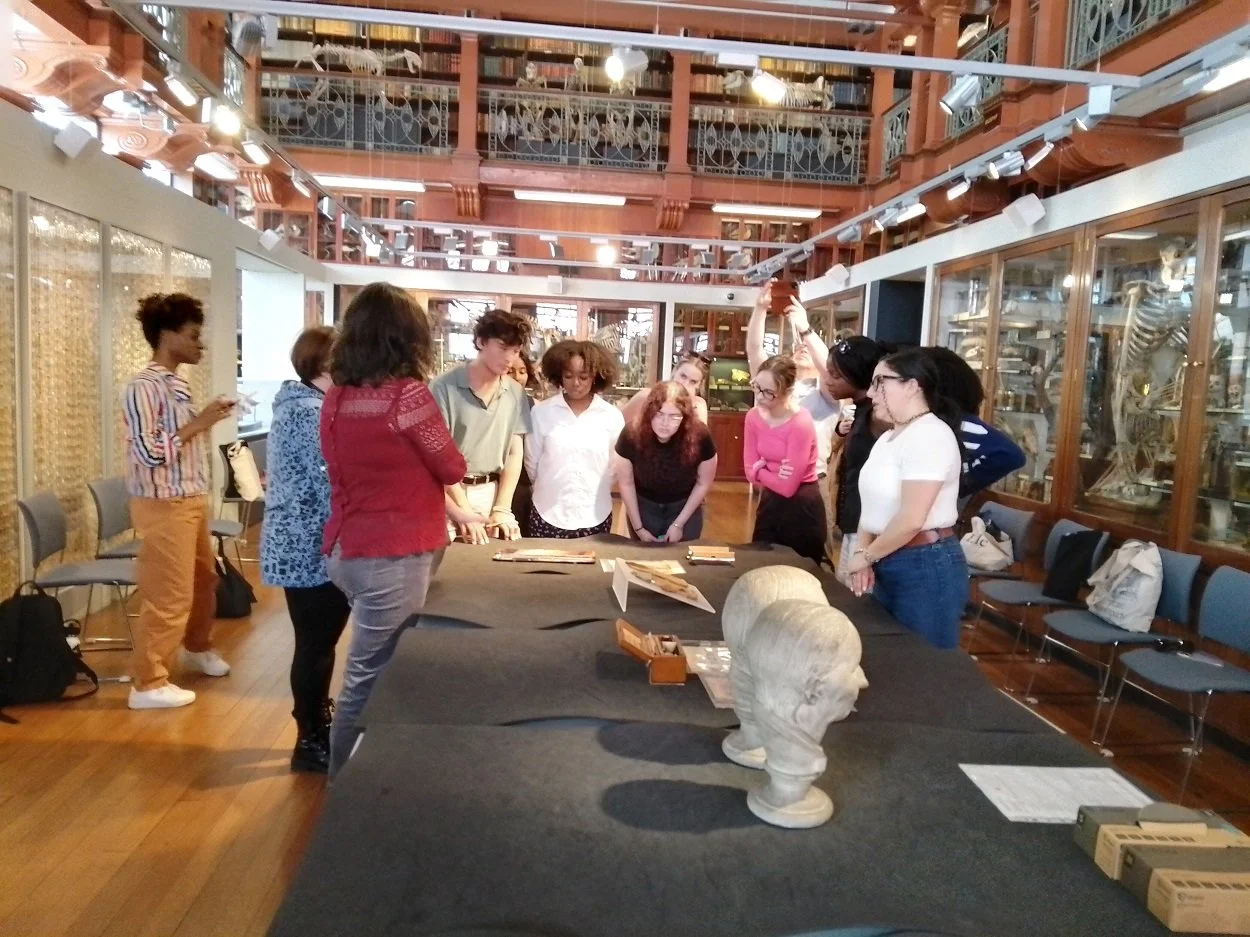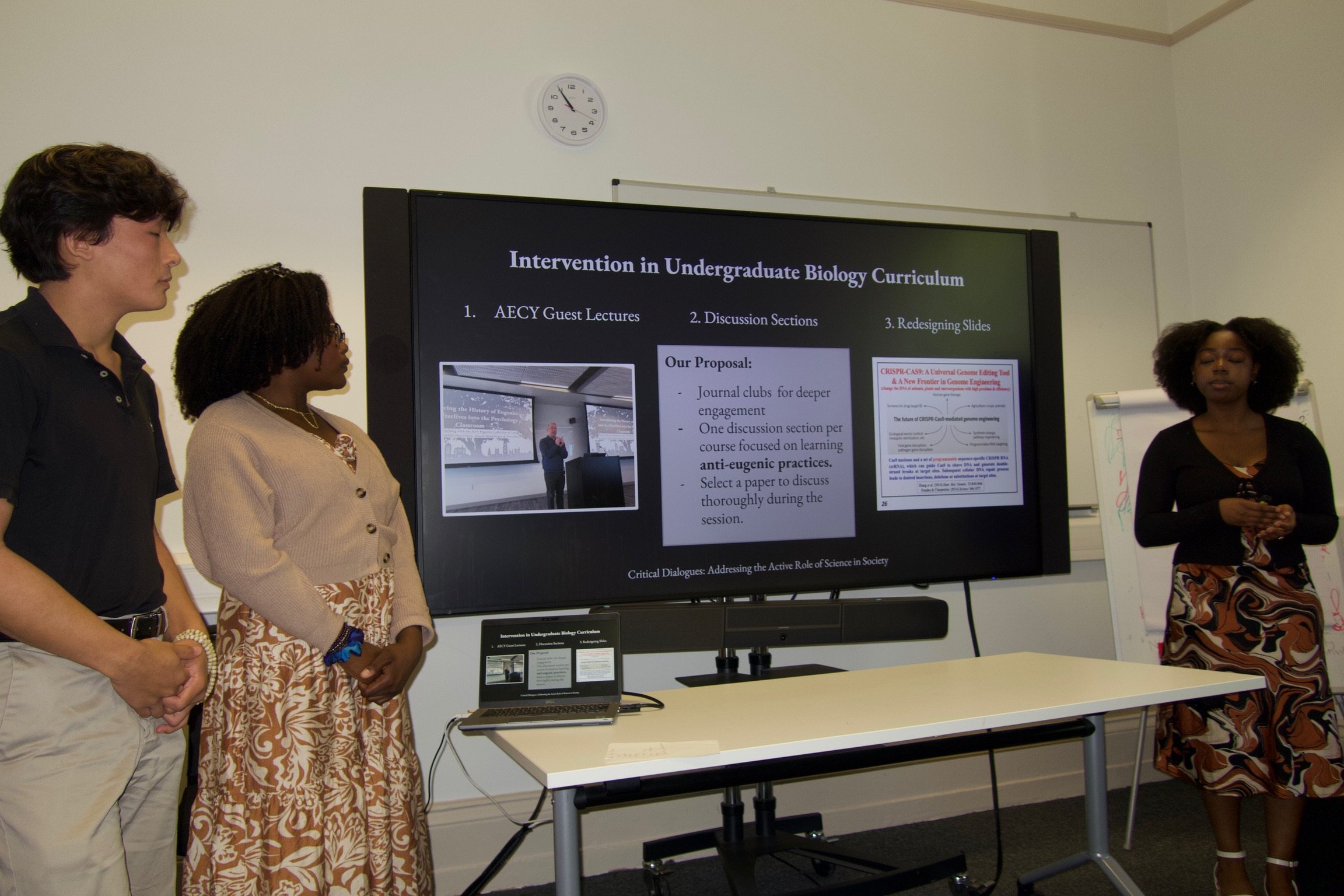Ongoing Collaboration with the Eugenics Legacy Education Project at University College London
Hayley*, a PhD student at Yale, and Tara*, a recently graduated senior at Yale, write about their experience visiting the ELEP team in London with the support of Public Humanities at Yale, the Center for the Study of Race, Indigeneity, and Transnational Migration (RITM), the Belonging at Yale program, and the Yale School of Medicine Office of Collaborative Excellence.
Hayley Maritza Serpa GSAS’30 (she/her/ella) is a PhD student in the Program in the History of Science and Medicine. Tara Bhat (she/her/hers) is a recent Yale Graduate who studied Political Science.
The AECY and ELEP teams outside of the Grant Museum of Zoology at the University College London campus, where we had a chance to visit ELEP’s Object-based learning lab.
This May, members of the Anti-Eugenics Collective at Yale were hosted in London for a visit with the Eugenics Legacy Education Project at University College London. Our visit was a continuation of our collaboration in January, where students at the AECY and ELEP co-hosted an international presentation about the role student-led work can play in addressing harmful institutional legacies.
In London, we continued this collaborative work, and it was fantastic to have an opportunity to learn from each other face-to-face. ELEP and AECY, projects both committed to working towards educating about the history and legacies of eugenics, have different backstories and have focused on different initiatives to combat these legacies over our years. Resultantly, we had both the opportunity to learn about UCL’s institutional history and learn about the different ways groups committed to anti-eugenics can respond to such histories. As Hayley describes below, over our two-day visits, we participated in several sessions where we investigated archives, visited historic sites of eugenics at UCL, and heard from scholars from the ELEP team. Throughout our trip, our joint focus was on thinking about ways to collaboratively move the project of anti-eugenics forward, drawing from our distinct bases of knowledge and experiences doing anti-eugenic work.
Day One in London: Making Meaning of Material
We hit the ground running on Monday, all of us wanting to make the most of our time together in London. For many, including myself, it was our first time visiting the city of Big Ben and, more relevant to our work, the birthplace of Sir Francis Galton, who coined the term “eugenics.”
The wonderful UCL team – led by Helen and Richard – welcomed us with the famous Brick + Mortals walking tour of UCL’s Bloomsbury Campus. This tour has been central to the anti-eugenics work the UCL community has undertaken over the years and included visits to the now renamed Francis Galton Lecture Hall, the also renamed Karl Pearson Hall (who as the first Chair of Eugenics at UCL), and the Petrie Museum of Egyptian Archaeology (named after a famous UCL eugenicist, suspiciously not renamed). Our conversation around a plaque that had been placed to commemorate the renaming of spaces named after eugenicists was one that has stayed on my mind. Both the ELEP and AECY collectively agreed that actions like these did little to address the root of the problem and that our work strives to do more and reach far more people than a plaque on a hidden wall could.
Plaque on UCL campus meant to commemorate the places at the university named after eugenicists
Shortly after, the morning took a turn into the nineteenth century, with an object-based learning session led by Helen and Isabelle at the UCL Grant Museum of Zoology. The Grant Museum – striking, beautiful, and filled with zoological specimens – served as the perfect backdrop for an interactive and engaging session with some of UCL’s own materials related to eugenics. These included phrenological head statues, hair color/type indexes, composite photographs of different human ‘types,’ and the special handmade gloves that Galton would use while in different parts of London researching individuals on the street.
We continued our adventures in UCL’s special collections with the expert guidance of Special Collections archivists Jo Baines and Leah Johnston. They had carefully selected an assortment of eugenics-related materials, including copies of Galton's works, copies of Pearson’s works, newspaper clippings related to eugenics, and even correspondence between Galton and his more famous cousin Charles Darwin. We were invited to think about how these materials differed or didn’t from Yale’s eugenics collections and American eugenics more broadly. For us, a visible difference was between the American eugenics movement’s focus on popular education for families and the wider public, while British eugenicists tended to focus on disseminating their work through research and the sciences.
Day Two in London: What’s Next?
Our second day in London began with our AECY presentation at UCL, titled ‘Addressing eugenics legacies at Yale University – the role of collaborative student-led projects.’ Professor Daniel HoSang and AECY Alumni Sarah Laufenberg (YC '23) started us off with an overview of our collective’s mission, work, and the broader history of eugenics at Yale. AECY student researchers Tara Bhat (YC ‘25), Mayah Monthrope (YC ‘25), Emma Peterson (YC ‘24), and Hayley Serpa (GSAS ‘30) presented their student research as Collective members on the intersection of law and eugenics, differences in eugenic practices and forced sterilizations across the U.S., eugenics and the obstetrician and gynecology professions, and the legacies of eugenic thinking in evolutionary biology and population biology. Incoming Yale College seniors Tenzin Dhondup, Modupe Karimi, and Hanifah Ouro-Sama described their ongoing work on rewriting the introductory biology undergraduate curriculum in partnership with the four Biological Science major programs at Yale. Our final speaker was Stacy Cordova-Diaz, an anti-eugenic advocate, author, AECY collaborator, and California teacher who spoke of the forced sterilization of her great-aunt as a part of eugenics in the United States during the early twentieth century.
Tenzin, Modupe, and Hanifah presenting on their work with the undergraduate biology curriculum at Yale University.
Our day ended with an engaging and exciting workshop led by Helen, Daniel, and Benedict Ipgrave, Chair of the FromSmallBeginnings Advisory Team and a leader in global anti-eugenics organizing. We were encouraged to collaborate and work together in planning a student-led global anti-eugenics conference – an opportunity that we all eagerly jumped on. Using oversized sheets of paper, colorful markers, and in rotating small groups, we were able to collectively brainstorm and write down some of the most exciting ideas for a conference that moves away from the standard, academic conference and instead, encourages the kind of reflective and dynamic conversations we strive for. This workshop was one of the most inspiring and motivating moments of our trip. It made us all imagine how we can work and build together towards anti-eugenic futures.
Benedict Ipgrave, from FromSmallBeginnings, leading a collective brainstorming activity for a global anti-eugenic conference.







